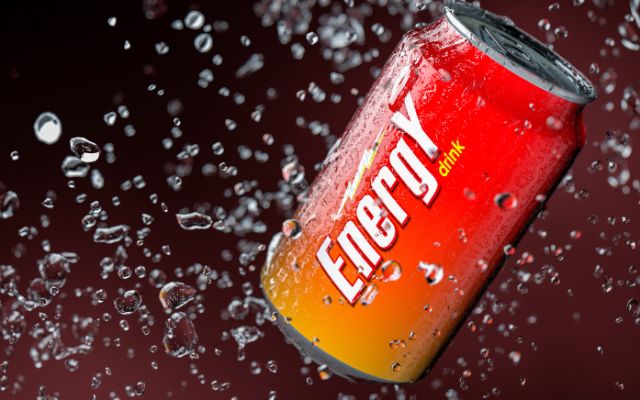Facts To Know About Energy Drinks- Knowledgeable Report

Facts To Know About Energy Drinks- Energy drinks are often advertised as items that boost metabolism while also improving mental alertness and physical performance.
When people are seeking to stay energized and hydrated, especially like athletes, it’s easy to be influenced by the marketing strategies of energy drinks. It’s important to realize, that drinks aren’t always a healthy or even safe way to hydrate.
This drinks are the most widely consumed supplement among teenagers and young adults, second to certain multivitamins. Men between the ages of 18 and 34 consume the most energy drinks, with nearly a third of youths aged 12 to 17 using them on a daily basis.
Sleep is frequently disturbed by the demands of our daily lives. To get through the day, many of us turn to energy drinks and other caffeinated beverages. But have you ever considered how these beverages affect your body? Are they in good health? Are they also secure?
Before you consume your next energy drink, you should be aware of the following facts. Knowing these facts could help you live longer and save your life.
Read Also-Nectarine Fruit: Nutrition Facts And Best Health Benefits
Facts To Know About Energy Drinks
What Are Energy Drinks?
Soft drinks and sports drinks are not the same as this drinks. Caffeine content is lower in soft drinks. Vitamins, carbohydrates, and sugar can all be found in sports beverages.
They should be consumed after a strenuous workout to help your body regain its fluid balance.
Caffeine and vitamins are the most common substances in energy drinks.
This gives them the appearance of being healthy and attractive, but this is not the case. These contain a lot of additional stimulants in them. This drinks are said to improve focus and performance.
Types Of Energy Drinks
| Available | Regular Energy Drink | Energy Shots |
| Available as | Bottles the same size as regular soft drinks, such as a16-oz. bottle | Compact canisters with 2 to 2½ oz. of concentrated drink. |
| Caffeine Content (Caffeine is a major ingredient in both) | 70 to 240 mg in a 16-oz. drink | 113 to 200 mg in an energy shot |
What Are The Ingredients
| Key Ingredient | Caffeine |
| Herbal Ingredients | Guarana, Ginseng, Synephrine, Gingko, Yerba mate |
| Amino Acids | Taurine, L-carnitine l-tartrate (LCLT) |
| Carbohydrates | Sugar, Inositol, Glucuronolactone |
| Vitamins | Niacin |
- Guarana: It is a herb that is used to combat fatigue and boost mental performance. It is also used to help people lose weight and boost their sexual desire. Caffeine is also included in guarana. As a result, the total caffeine content of the energy drink is much higher.
- Taurine: It’s a amino acid supplement that helps with memory and endurance.
- Ginseng: Herbs that can help you relax, strengthen your muscles, and increase your endurance.
- Synephrine (bitter orange): An herb that aids in weight loss.
- L-carnitine l-tartrate (LCLT): It’s a supplement that boosts your energy, memory, and quickness. It’s also used to dissolve fat.
- Yerba Mate: An herb that is used to boost mood and reduce fatigue.
- Gingko: An herb that is used to improve concentrate and avoid headaches.
- St. John’s Wort: It is a herb that is used to treat a variety of ailments. An herb that can help you relax and feel better.
These aren’t necessarily dangerous on their own. They can create health problems when taken with coffee.
Need No FDA Approval
When it comes to choosing components for energy drinks, there is no need for FDA clearance.
Traditional sodas are recognized drinks by FDA, and are subjected to strict caffeine dosage and ingredient rules. This drink, on the other hand, are considered dietary supplements and have gotten through numerous FDA laws thanks to a loophole developed by the Jolt Cola beverage manufacturer.
As a result, the ingredients in energy drinks must be stated, but there is no necessity to list the exact amount of each element in these drinks.
High Caffeine Content
Caffeine levels in energy drink can be higher than in sodas. Contrary to popular opinion, there is no legal limit on the quantity of caffeine that corporations can put into energy drinks, and this drinks have been found to contain up to ten times the amount of caffeine as soda drinks.
It’s vital to remember that the amount of caffeine in an energy drink isn’t comparable to that in cola beverages, and that caffeine’s effects are dose-dependent.
The higher the dose, the more probable you will get jitters, sleeplessness, irregular or racing heartbeats, perspiration, anxiousness, or seizures.
Energy Drinks Are Not The Best Choice For Hydration
For hydration, this drinks are not the best option. Water is the best fluid for hydration, according to various studies, and thirst is the best indicator of how much someone needs to drink to keep well hydrated.
These drinks are high in sugar and caffeine (or other stimulant) content, which tends to dehydrate the body and pose additional health hazards, such as caffeine-related side effects and extra calories that contribute to weight gain.
These drinks should not be consumed as a source of hydration before, during, or after physical activity.
Side Effects
The person, type, and amount of given dose all have different side effects. The following are some of the reactions to energy drinks:
- Headaches, stomachaches, or diarrhoea are all possible symptoms. It could be due to a lack of water or a poor diet.
- Chest pain
- Feelings of anxiety or nervousness
- Dizziness or a lack of concentration
- Having trouble falling asleep
- Due to the sugar and calories in energy drinks, you may gain weight or develop diabetes.
- Dental problems
- Restlessness and muscle weakness
- Ear and eye problems
- Polyuria (excessive urination)
Energy Drinks Can Also Cause Serious Health Problems, Such As:
- Withdrawal and addiction
- High blood pressure
- Seizures
- Heart problems: Many people claim to have a fast heartbeat. Uneven heartbeat or heart failure has been connected to heavy use. Death has been attributed to a few incidents.
Who Should Avoid Energy Drinks?
This drinks should not be consumed by children, teenagers, pregnant or breastfeeding women. Whether you decide to take energy drinks, let your doctor know if you’re taking any medications or supplements.
Caffeine sensitivity is more common in children. It may be detrimental to their development. People with heart disease or asthma are also at a higher risk.
Things To Consider
Another harmful trend is the use of energy drinks. Mixing these drinks and alcohol is not a good idea, but it is considered “cool” and usual now. Mixing them together can make you feel less inebriated than you actually are.
People who mix caffeinated drinks and alcohol may not be able to identify how drunk they are; they may feel less intoxicated than if they had not consumed caffeine, but their motor coordination and response time may be just as compromised.
It also has an impact on your capacity to make excellent decisions. It’s the same if you combine energy drinks with illegal substances or prescription medications.
Conclusion
Caffeine, vitamins, and herbs are all common constituents in energy drinks. They claim to boost your energy levels and help you feel more alert.
Energy drinks can have substantial health consequences, according to a growing body of scientific research, especially in children, teenagers, and young adults.
Caffeine concentration in energy drinks varies a lot, and it’s not always easy to figure out how much caffeine is in them. Some energy drinks are sold as drinks, while others are sold as dietary supplements. Caffeine content is not required to be declared on the label of either type of product.
Disclaimer
The opinions presented in this article should not be regarded as a replacement for medical advice. For more information, please contact your treating physician.



